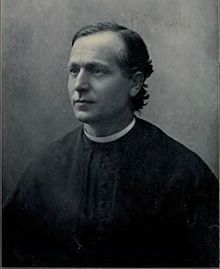Andrej Hlinka
| Andrej Hlinka | |
|---|---|
 |
|
| Born |
27 September 1864 Černová Liptó County, Kingdom of Hungary, Austria-Hungary |
| Died | 16 August 1938 (aged 73) Ružomberok, Czechoslovakia |
| Political party | Slovak People's Party |
Andrej Hlinka (September 27, 1864 – August 16, 1938) was a Slovak Catholic priest, journalist, banker and politician, one of the most important Slovak public activists in Czechoslovakia before Second World War. He was the leader of the Slovak People's Party (since 1913), papal chamberlain (since 1924), inducted papal protonotary (since 1927), member of the National Assembly of Czechoslovakia (the parliament) and chairman of the St. Vojtech Group (organization publishing religious books).
Born in Černová (today part of the city of Ružomberok) in the Liptó County of the Kingdom of Hungary (present-day Slovakia), Hlinka graduated in theology from Spišská Kapitula and was ordained priest in 1889. He tried to improve the social status of his parishioners, fought against alcoholism, organized educational lectures and theater performances. He founded credit and food bank associations to help ordinary people and wrote manual how to found further.
In his political views he was a strong defender of Catholic ethics against all secularizing tendencies connected with economic and political liberalism of the Kingdom of Hungary at the end of the 19th and the beginning of the 20th century. This was also the opinion of the Hungarian Katolikus Néppárt (Catholic People's Party), led by Count Zichy, so Hlinka became an activist of this party. However, as the party disregarded Slovak demands Hlinka left and along with František Skyčák founded the Slovak People's Party.
He gained wide popularity thanks to his social activities. In 1905, he was elected parson in Ružomberok against the wishes of his Hungarian bishop Alexander Párvy. In the elections of 1906, he supported Slovak candidate Vavro Šrobár and featured in favor of the Slovak national movement. His activities met with disapproval from the church hierarchy, which suspended him as a priest. On June 27, 1906, he was imprisoned and later convicted of sedition. While Hlinka was suspended and waited for admission to prison, the bishop tried to consecrate the church in Černová (built thanks to Hlinka) by force. The Černová massacre brought international attention to violations of national rights in the Kingdom of Hungary. In prison, Hlinka led the translation of the Old Testament into the Slovak language. His friends worked on his rehabilitation and Hlinka, who complained of his suspension to the Holy See, finally won the case against the bishop.
...
Wikipedia
